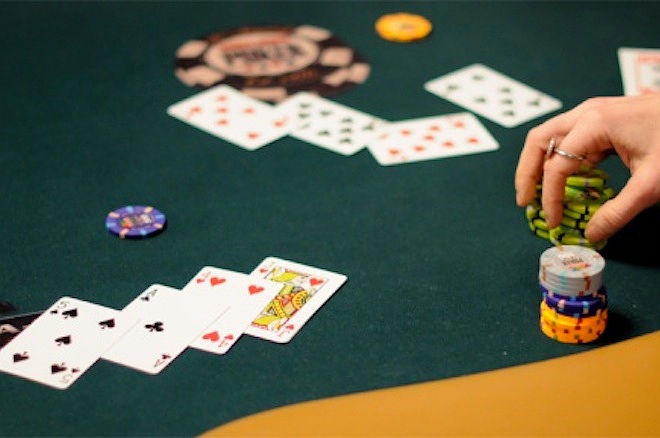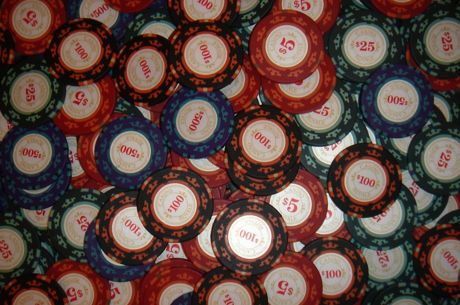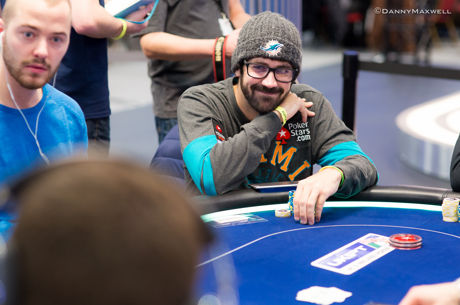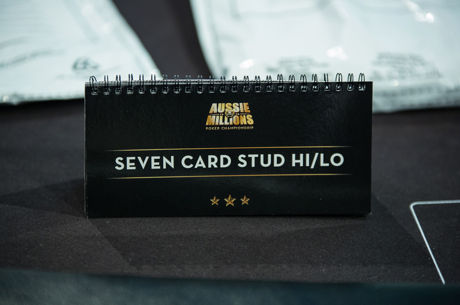Using Exposed Cards When Reading Hands in Seven-Card Stud

With the 2016 World Series of Poker just over a month away, variants other than no-limit hold��em are starting to gain some extra attention as there are so many non-NLHE offerings on the WSOP schedule. For that reason, I��m taking a slight departure from my typical columns about home games to spend the next few looking at seven-card stud strategy.
Stud is infrequently spread as a stand-alone cash game, and aside from the WSOP is rarely featured in tournaments in public poker rooms these days. Gone are the days when it was the most common form of poker, replaced as it has been by hold��em in both its limit and no-limit format.
When you find seven-card stud, it is typically one of the variants in a mixed game of some kind �� often as part of a H.O.R.S.E. or H.O.S.E. rotation or tournament. (H.O.R.S.E. is an acronym for the games of Hold��em, Omaha Hi-Low Eight-or-Better, Razz, Stud, and Stud Hi-Low Eight-or-Better.) Most players only have a very superficial knowledge of the stud games, so if you can ramp up your knowledge of them you��ll have an advantage. That��s the purpose of this series of articles.
There��s a lot to recommend stud, though it��s not for everyone. Stud in all its forms rewards those who can combine strategic thinking, card memory, and an understanding of how exposed cards relate to opponents�� likely holdings. You won��t pick up enough in these short articles to beat stud specialists, but in this and the next few columns I��ll be looking at aspects of the game that will help you beat most of today��s poker players who have never advanced beyond the beginning or intermediate levels of competitive stud play.
Today let��s get started with an initial strategy tip unique to stud games �� one that can help you right away:
Use your opponents�� exposed cards, and the cards that have been folded, to infer what they are likely to have.
This is key strategic consideration in stud that is not applicable to hold��em. If you learn how to do it well, you will have a huge advantage over your hold��em-centric opponents. We��ll look at some examples from seven-card stud (high only) to help you understand how this is so.
If, for example, an opponent shows a Kx on third street (first three cards) and raises, assume he is raising with a pair of kings. True, he could have a hidden pair, or even two unpaired cards in the hole. But his likely holding, given his raise and his exposed card, is a pair of kings.
Similarly, if a player raises with a Kx exposed, and, in a multi-way pot, another good player reraises with a 6x exposed, it��s reasonable to assume that the reraiser has at least a pair of sixes with an ace-kicker. He wouldn��t be expected to do this with any lesser hand.
As the hand progresses, then, you will use added information that becomes available to you to update your estimate of what your opponents hold. It helps to keep track of the folded cards, combining them with the cards you see exposed to help you correctly infer what your opponents are likely to hold (and not likely to hold).
Here��s an example from the third round of betting (i.e., ��fifth street��):
You: A?9? / 9?A?5?
Bob: XxXx / 2?Q?Q?
Mike: XxXx / J?8?K?
folded cards: 3?7?Q?10?7?4?6?
In the first betting round, Bob paid the bring-in with his low card showing (2?), then Mike raised with his J? up. You then called with your pair of nines and ace-kicker.
Then on fourth street, with your exposed ace-high (giving you two pair, aces and nines, you bet. Bob, showing two diamonds, called, and Mike called as well with his two spades showing.
Here on fifth street, Bob paired his queens and bet. Mike, now with three spades, just called. It��s up to you. What do you do?
A thoughtful but inexperienced stud player might call, seeing Mike��s three spades and worrying that he might be slow playing a flush. Such a player might also be worried that the paired queen board indicated the possibility of trip queens for Mike.
But the good stud player would remember that Mike raised on third street with his jack up, something most players would not do with a three-flush and indicating that he probably had a pair of jacks. Also helpful is the fact that there have been four spades already folded �� look back at those folded cards �� and you hold two more, making it unlikely (though not impossible) that Mike has two spades in the hole and a flush.
Also useful in helping you evaluate Mike��s hand is the fact that Bob had two diamonds exposed as his first two cards, and no diamonds have been folded, suggesting that he, too, is on a flush draw. It would also be useful to remember that a queen has been folded, reducing the chances Bob holds another queen in the hole. Those factors make it even less likely that Mike would slow play a flush here on fifth, as he would not want Bob to keep drawing cheaply to a possibly higher flush.
Accordingly, since you would infer neither Mike nor Bob had a better hand than you at this stage in the betting, and since you would want to make it as expensive as possible for your opponents to draw against you, you would realize that your best betting action here on fifth street would be to raise.
These situations regularly arise in stud. As you can see, in stud (unlike in hold��em) you have a lot of visible information to keep track of as you try to figure out the likely holdings of your opponents. Using that information to inform your strategic decisions can give you a significant edge over the less knowledgeable and less thoughtful opponent.
In my next column we��ll deal with card memory in stud games, an especially useful skill to develop.
Ashley Adams has been playing poker for 50 years and writing about it since 2000. He is the author of hundreds of articles and two books, Winning 7-Card Stud (Kensington 2003) and Winning No-Limit Hold��em (Lighthouse 2012). He is also the host of poker radio show House of Cards. See www.houseofcardsradio.com for broadcast times, stations, and podcasts.
Want to stay atop all the latest in the poker world? If so, make sure to get PokerNews updates on your social media outlets. Follow us on Twitter and find us on both Facebook and Google+!









